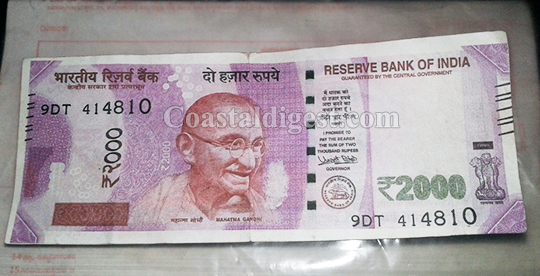Mangaluru, Nov 23: Within a couple of days after the new Rs 2,000 notes went into circulation, miscreants in many parts of the country had duped innocents using its colour photo copy.

Now, the fake currency notes Rs 2,000 have surfaced in Bantwal taluk of Dakshina Kannada district triggering panic among the people in coastal Karnataka.
On Tuesday a resident of Punacha village near Vittla in Bantwal was taken aback after he was told that Rs 2,000 note he carried was just a colour photo copy of the original.
In a complaint to Vittla police, Krishnappa, said that he pledged his gold ring at a outlet of Muthoot Finance and got the Rs 2,000 note.
He used the note to purchase liquor at the outlet of MSIL. As he was going towards his house, two MSIL employees came in a vehicle and stopped Krishnappa. They told him that the note he had given was a colour photo copy of the original.
They took away the liquor and gave him back the note he had given them. Krishnappa went to Muthoot Finance who denied having given him the note.
He also went to the branch of Syndicate Bank from where the finance company had brought the money. The bank officials too denied that they dispensed with such a note. The police said that they are looking into the issue now.
Also Read: Rs 2000 fake notes already out; farmer duped with colour photocopy of note






Comments
Chaddis gone Pantloons came, Notes gone Faku Notes started, Bap ray Bap what's happening these Criminal Looters ruling, Master Narean Where are you???? now do not come front, let it dissolve all these note dealings after we will see how it works!!!!!
Subbu, Mangalore,
That app is only for fun. Not for scanning the currency. It does work even on a xerox copy of new Rs.2000 note.
Need to keep an eye on BANGHI PARIVAR.
What Bhakts said and what happened ?
1] Demonetization will stop fake currency circulation.
- Fake currency starts off from their favourite United States of Gujarath and goes across the country.
2] It will stop terrorists funding.
- 3 terrorists held with the New Rs. 2000 note currency, while poor still stand in long queues at banks.
3] Black money will be stopped and black money holders will be jailed.
- SBI waives off loans of more than 50 loan defaulters including Vijay mallya.
4] Demonetization will boost economy
- All markets affected due to lack of sales activities in the past 2 weeks.
- Dollar is higher than ever at Rs. 68.14/ USD.
5] 15 Lakhs will surely com into ur account.
- Government takes people's own hard earned money to fee the crony capitalists, even at the cost of 56 people's death till today.
Mistron, Acche Din Aagaye, ab phir ek bar BJP sarkar
All thanks to Fenku.
This is the trap played by the liquor shop .....
It seems like Bantwal is notorious for fake currencies.....need to keep an eye on it by security system....
Add new comment